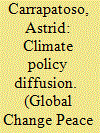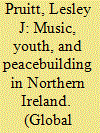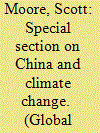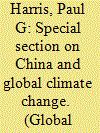|
|
|
Sort Order |
|
|
|
Items / Page
|
|
|
|
|
|
|
| Srl | Item |
| 1 |
ID:
105163


|
|
|
|
|
| Publication |
2011.
|
| Summary/Abstract |
National climate change policies are becoming similar, which can be interpreted as being a result of policy diffusion processes. Many of those policies are inspired by EU climate strategies. The EU actively promotes these policies in its external relations, such as in its partnership on climate change with China. This leads us to three sets of questions. Does the EU act as a transformative power in interregional cooperation on climate change? Can we identify a climate change policy diffusion process in EU-Chinese relations, and, if so, which communication channels as well as diffusion mechanisms can be identified? And, finally, is interregional cooperation on climate change a building block or a stumbling block in the global climate change regime? This article argues that the policy diffusion process depends on the scope of the interregional communication process between the EU and China, and the willingness and national responsiveness of China to adopt policy innovations.
|
|
|
|
|
|
|
|
|
|
|
|
|
|
|
|
| 2 |
ID:
105166


|
|
|
|
|
| Publication |
2011.
|
| Summary/Abstract |
The emergence of the human security norm in global security studies continues to attract debates among international relations experts and security analysts. One of the dimensions of the debate is centred on the security focus of the newly created African Union (AU) that replaced the Organisation of African Unity on 26 May 2001. In view of the impact of violent conflicts on socioeconomic development of African states and peoples, the African Union has made the pursuit of peace and security one of its central functions. The security focus of the AU is fostering intra-regional cooperation as well as interregional cooperation to develop the AU's capacity to intervene in conflicts. This article explores the interregional security cooperation that is emerging between the North Atlantic Security Organization (NATO) and the African Union with regard to the building of the capability of the African Standby Force (ASF). I argue that the AU-NATO security cooperation is a unique relationship in the history of regional organisations in Africa and that this relationship has been fostered by a shared 'militarised' understanding of human security and the threat that insecurity in Africa poses to global security.
|
|
|
|
|
|
|
|
|
|
|
|
|
|
|
|
| 3 |
ID:
105165


|
|
|
|
|
| Publication |
2011.
|
| Summary/Abstract |
This article presents a preliminary analysis from a case study conducted in Northern Ireland. Participant observation and semi-structured interviewing were used to learn whether music might serve as a useful tool for engaging Northern Irish youth in peacebuilding. Obstacles and limitations certainly exist, but the data suggests that music can be used to engage youth in peacebuilding in three key ways: (1) music can be useful in bringing youth together to share meaning, and as such is an alternative way to engage in dialogue for building peace; (2) music-making can help youth gain self-esteem and reconsider their view of others in a way that can help to destabilize conflict identities; and (3) by taking part in musical programs, violence by, against, and between youth may be reduced or prevented by changing the way youth experience the spaces they inhabit and/or by providing alternative activities to rioting.
|
|
|
|
|
|
|
|
|
|
|
|
|
|
|
|
| 4 |
ID:
105164


|
|
|
|
|
| Publication |
2011.
|
| Summary/Abstract |
Protocol I, Additional to the Geneva Conventions, in Article 57, mandates the rule of proportionality governing military attacks. The literature on international humanitarian law, however, reflects a widely-held view that this mandate is often ignored. Motivated by that view, this paper discusses three strategies, which, by appealing to ubiquitous social values, can encourage respect for and, in turn, compliance with the proportionality rule. These strategies are: first, interpreting a proportional attack as one which requires a rational and equitable balance, in cost-benefit terms, of the conflicting military and humanitarian interests, respectively, of the attacking and the attacked Parties (without sacrificing the desired military advantage of the former); second, requiring a planned attack to be 'objectively proportional', as measured by the preferences, quantified in statistical terms, of the 'reasonable military commander'; and, third, requiring the attacking Party to compensate victims for incidental civilian damage resulting from an attack that is not objectively proportional. Observance of the principle of proportionality depends upon voluntary compliance, induced by respect for this principle, since compliance is not compelled under current international law.
|
|
|
|
|
|
|
|
|
|
|
|
|
|
|
|
| 5 |
ID:
105161


|
|
|
|
|
| Publication |
2011.
|
| Summary/Abstract |
China's policy related to climate change is a complex and seemingly contradictory amalgam of initiatives across a range of policy areas. Nonetheless, a nuanced understanding of China's stance on climate change is necessary to understand the process of international climate negotiations. This article seeks to clarify and expand understanding of China's climate policy through an analysis of how specific aspects of climate policy relate to the core interests of the Chinese Communist Party. Climate change presents both threats and opportunities to these interests, and it is chiefly the calculus of threat and interest which guides China's policy on climate change.
|
|
|
|
|
|
|
|
|
|
|
|
|
|
|
|
| 6 |
ID:
105160


|
|
|
|
|
| Publication |
2011.
|
| Summary/Abstract |
Climate change presents much of the world, and possibly most of it in the long term, with chronic human insecurity. More than any other country, China has become a central actor in the practical and political aspects of this problem. On a practical level, it is the largest national source of greenhouse gases (GHGs) causing global warming, and the rapid increase in its GHG emissions means that its contribution to climate change will continue to grow for some time. Politically, China's role in climate change diplomacy is crucial to so-far failed efforts by states to reach consensus on robust efforts to reduce GHG pollution and to respond to the inevitable consequences of climate change. China's domestic policy responses to the problem convey important signals that will influence the behaviour of other national actors. Without China playing a major part in efforts to curb GHG pollution, notably through limitations on its future emissions, international efforts to mitigate global warming substantially will certainly fail.
|
|
|
|
|
|
|
|
|
|
|
|
|
|
|
|
| 7 |
ID:
105162


|
|
|
|
|
| Publication |
2011.
|
| Summary/Abstract |
China's rapid economic growth has given rise to equally sharp increases in greenhouse gas emissions. China has already ratified the Kyoto Protocol, yet as the world looks beyond Kyoto, China's willingness to agree to a binding carbon emissions treaty remains a critical question for the international community. This article examines historical adjustments to and recent actions on China's climate change policy, as well as its potential future trajectory, to determine the factors that most shape China's ideal post-Kyoto accord. It analyzes different perspectives on China's involvement in the Copenhagen Summit, the rise of BASIC, and UNFCCC meetings in Tianjin. This article concludes that China, while taking actions to combat climate change domestically, retains much of its historic stance on climate change, which precludes agreeing to external oversight and externally binding emissions cuts.
|
|
|
|
|
|
|
|
|
|
|
|
|
|
|
|
|
|
|
|
|